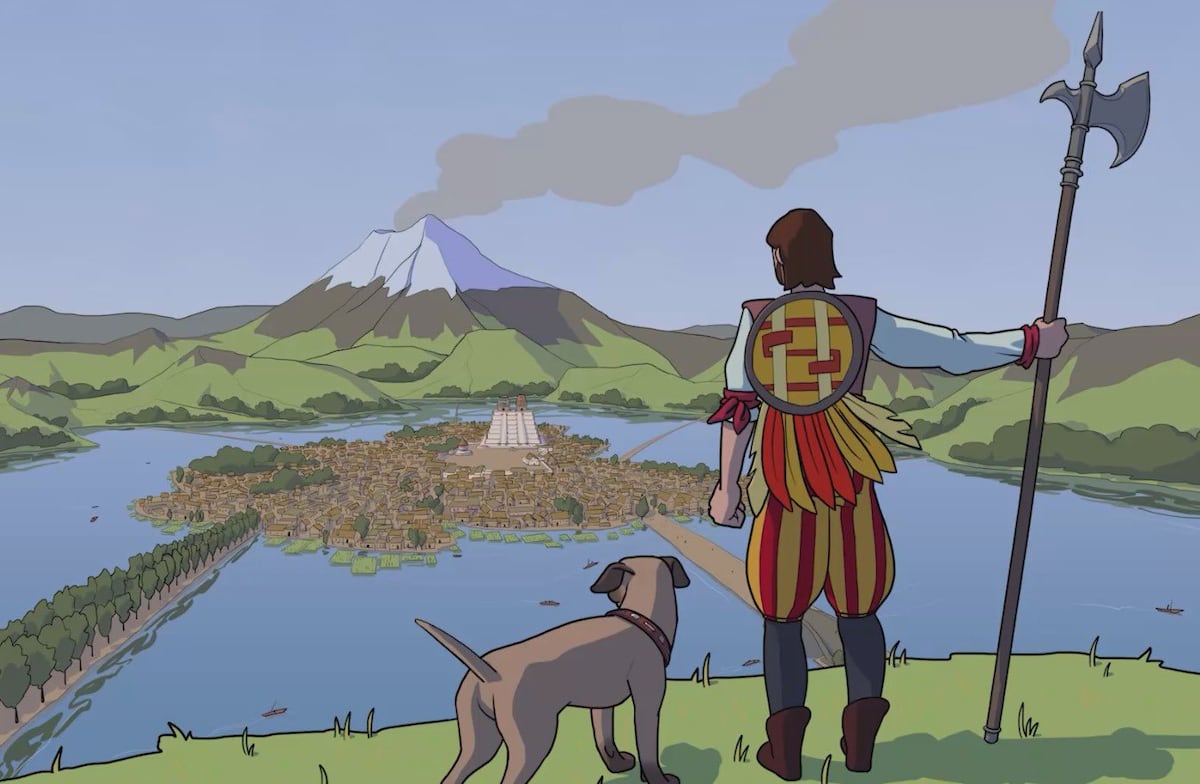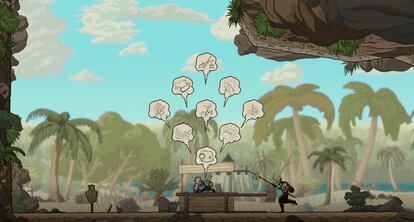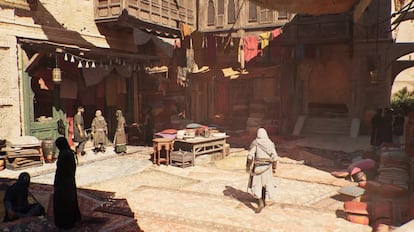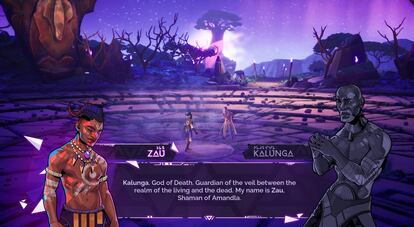Plus Ultra: Legacy: Learning history by pressing buttons: when the teacher is a video game | Culture

At age 17, Diego Rodriguez-Ponga first dreamed of making a video game about conquering Mexico. Fifteen years later, the title is about to see the light of day: Plus Ultra: Legacy, which chronicles the encounter between Spanish and Mesoamerican explorers five centuries ago. Although the story of the work is fictional (the main character Don Juan is a Spanish explorer who arrives in Veracruz during the Conquest to arrest Hernán Cortés, whom the Crown considers a traitor), it makes the most of contextual opportunities to explain the history of the Mexican conquest, the struggle between the Aztecs and the Mexicans, or the importance of figures less famous than Cortes or Moctezuma, but no less important, such as the Afro-Spanish Juan Garrido or the soldier Maria de Estrada. “There are video games that teach you a lot. “They taught me a lot when I was a student and also strengthened my love for history,” says Professor Alejandro Rodríguez de la Peña, professor of medieval history at CEU San Pablo University and author. In addition to digital entertainment, the launch Heritage illustrates one of the industries with the greatest potential for this type of leisure: disseminating historical lessons through recreation of the past.
“Everything comes from the idea of conveying the love of history through a video game,” says Rodriguez-Ponga (Madrid, 31) about Heritage. The work in two dimensions combines action and exploration in what is known as genre. metroidvania. “These games tend to have a claustrophobic and dark atmosphere. I wanted to move away from that because it didn’t do justice to the colorful Mexico we wanted to tell,” notes its creator. In games of this genre, which typically do not feature hyper-realistic graphics, visual style is critical. For Heritage, Rodríguez-Ponga and his team opted for a crisp comic book-like aesthetic that pairs very well with the very colorful offering they have developed. “Every game must be played through the eyes,” says Rodriguez-Ponga, who is very clear about his influence: Super Metroid, Machinarium, Hollow King or Spanish Blasphemous.
These are his artistic references, since the main theme (the union of Spain and Mexico) affected him from birth: thanks to the work of his parents, his brother Alfonso was born in 1988 in the Mexican capital. Together (Alfonso heads the financial side) they are the soul of the game development company: Póntica. After the pandemic, Rodriguez-Ponga began working on the project almost obsessively in his spare time. He convinced several small investors to let him shape the company until it goes public in 2021. For Heritage They joined a crowdfunding campaign: they asked for 25,000 euros, and they significantly exceeded 130%. New ones can be added to the company’s six permanent employees, now that the game is guaranteed.

One of the most unique features of the game is that it will be translated into Nahuatl. “Tlaxcaltecas and the Mexicans eventually turn Nahuatl into the vehicle language of Mexico, which skyrockets in popularity during the conquest,” Rodriguez-Ponga says. “Promoted by the Spanish, Nahuatl eventually became a printed grammar before English or German. When Mexico became independent in 1821, 60% of the population spoke Nahuatl,” he adds. This translation is one of the best recent examples of the marriage of leisure and history that can occur in a game.
Concerns in the academy
“In general, the academic world continues to turn away from video games, branding them as mere leisure rather than a form of learning. It is forgotten that oty In the Western tradition, it is an integral part of cultural life, as evidenced by the educational role of gymnastics in the classical world or chess and tournaments in the medieval world,” says Professor Rodríguez de la Peña.
“Sagas like Age of Empires or Assassin’s Creed, Although their narrative lacks historical rigor, they demonstrate truthfulness in everything that concerns the setting of their setting. Constantinople or Florence Assassin’s Creed They are a good example of this. He Civilization Sid Meier allows a person without special historical knowledge to understand the process of development of civilization from its origins. But what I value most are some strategy video games that are so well documented and executed that they are a valuable tool for studying history, geopolitics or military tactics,” he explains. “All of Paradox’s games are extraordinary, but deserve special mention. Europe Universalis And Crusader Kings for the richness of the interface and the rigor of the historical context.”

In addition to the classics that have taught historical lessons to players for decades, recent years have seen the addition of games that examine specific moments with great precision: feudal Japan (Rise of the Roninsaga Shogun, Ghost of Tsushima), medieval Europe (The kingdom has come), World War I (Valiant Hearts) or classical Rome (saga Caesar). It’s no coincidence that many of these games create very accurate historical reconstructions, but teams are increasingly adding historians to their teams to provide advice as they adapt to the past. In terms of budget and scale, the saga of Assassin’s Creed (with games based on ancient Egypt, the Viking attack on England, the Florentine Renaissance, ancient Greece or 9th century Baghdad) is one of the most notable.
Bantu mythology
“I’ve loved games all my life. Even in my acting work, I have always taken some guidance from them,” says Abubakar Salim (Hertfordshire, 31), a Kenyan-born British artist. Salim worked as an actor in Origin of Assassin’s Creed and for this he was nominated for a Bafta award. “Through this nomination, I was introduced to the industry behind the scenes and that is where my passion for storytelling through games began.”

“I think video games and culture are already very united,” says Salim, the creator of one of this year’s most talked-about works: Tales of Kenzera: ZAU, a game that delves into and conveys Bantu mythology. “Bantu legends have the same purpose as Greek, Norse or Indian myths: to share stories that help us learn and grow as people. The difference, however, is that they cover a lot of different tribes, which means a lot of different perspectives, so ultimately there are a lot of lessons to be learned from them,” he says. Yeah Heritage It will be translated into Nahuatl. ZAU follow this bet: it is beautifully dubbed in Swahili.
“It was important for me to reflect this in ZAU because these are the stories that my family, especially my father, told me. From my grandfather’s stories, I learned the stories of my ancestors. Also, when I was working on the series Raised by wolvesI learned another facet of South African stories and myths (we filmed in Cape Town). These stories are so powerful, so rich, and so interesting to the community that it was imperative to include them along the journey ZAU“
Languages, landscapes, cultures, architecture, urban planning, stories. Of course, there are all kinds of video games, but a significant portion of them present an “intellectual challenge for students,” according to Professor Rodriguez de la Peña. A type of video game, many of which have historical backgrounds, which are “challenging because they require time, attention and study” and which, at heart, exemplify the way of learning that will evolve in the future. As the professor says, “A healthy part of the video game world will eventually become part of the culture in its own right.” While.
All the culture that accompanies you is waiting for you here.
Subscribe
Babelia
Literary news analyzed by top critics in our weekly newsletter.
GET THIS
Subscribe to continue reading
Read without limits
_
